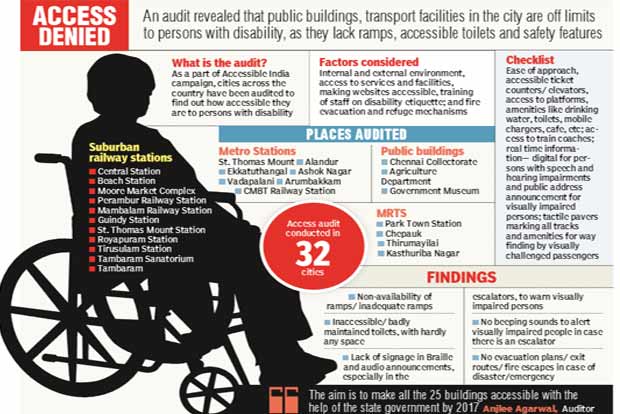Begin typing your search...
City scores low on disability audit
As part of Central Government’s Accessible India campaign, 25 public buildings and transport stations across the city were audited; most of these public spaces are inaccessible to persons with disability.

Chennai
The checklist for conducting the audit took into account features such as availability of ramps, signage in Braille, audio announcements and other amenities that will make public spaces accessible to persons with disability. Anjlee Agarwal, Executive Director of Samarthyam, who conducted the audit with a team of persons with disabilities, said most of the city’s public buildings and transportation are not accessible to all.
“Many suburban railway stations were really inaccessible. Some of the stations had a ramp at the entry point, however many stations were inaccessible as people had to use the foot overbridge to the station from the road level and there was no ramp access. The Chennai Metro stations had taken into account all the parameters but there were a few glitches, mostly due to site constraints. For example, some stations were on the road, which made it difficult for people to cross the road and reach these. The whole point is not just getting access to places but also to factor in independence and safety while crossing roads and accessing stations,” she said.
The interiors too, she revealed, left much to be desired. “The toilets in station buildings were inaccessible, with small doors and hardly enough space. In Vadapalani metro station, the accessible toilets had no proper space. Moreover, there is no proper signage to indicate where the accessible toilets are, no Braille lettering in the lift, no beeping sounds to alert a visually challenged person if they are approaching an escalator – such features are missing,” she explained.
Anjlee also pointed out that public office buildings had merely a tokenistic approach to accessibility. “There was a ramp at the Collector’s Office, which was good however there were no other facilities in the building such as accessible toilet, tactile pavers, way finding signage and fire escape alarm facilities. The Agriculture Department too was the same as the ramp was extremely steep and that I had a hard time using my wheelchair across it. In each floor, an accessible toilet should be made available and flooring should not be slippery/ glossy,” she added.
Despite the many lows, Anjlee conceded that Chennai has the will to make its public buildings accessible and sensitise officials. “Accessible India Campaign is conducting outreach initiatives and sensitisation of the decision makers and service providers. Also, the State Commissioner for Differently Abled, Government of Tamil Nadu, is getting the estimates prepared for all the 25 sites and funds will be made available on first-come-first-serve basis from the Central Govt. Department of Empowerment of Persons with Disabilities, Ministry of Social Justice & Empowerment endeavours to make all these buildings accessible with state governments by June 2017,” she concluded.
Smitha Sadasivan, member of Disability Rights Alliance (DRA), recalled that her visits to the Secretariat – one of the most important government buildings – were fraught with fears. “For the past eight months, I have been visiting the Secretariat to liaise with the Chief Electoral Officer, to ensure inclusive elections. Each time, I had to navigate the stairs and use an inaccessible toilet. I was worried that I would fall down. Since I have multiple sclerosis, even a small jerk gives me back and neck pain. But at the Secretariat, they gave us a ramp with broken edges, which further causes damage to our body. Or, they say they will lift us physically – which is scary. We feel like a piece of luggage; it hurts our dignity,” stated this activist.
Smitha pointed out that despite the fact that Persons with Disability Act was passed in 1995, little has been done towards improving accessibility. “Making one building accessible is not going to help – we need to ensure that all our buildings are accessible to all. No effort has been taken until now,” she added. Simma Chandran, President of Federation of Tamil Nadu Differently Abled Association, drew attention to the lack of focus on providing accessibility.
“A Government Order was passed in 2013 to make all public buildings accessible in Tamil Nadu. But until now, nothing has been done. Not one public building is accessible,” he said. He pointed out that persons with disability can’t venture out freely due to this setback. “If a person with disability wants to watch Kabali or any other movie, they can’t do so because many cinema halls are not accessible. The same goes for High Court building, college auditoriums, marriage halls, malls, diagnostic centres and shopping destinations — buildings which are frequented by people. There is a lack of interest in catering to the needs of persons with disability, despite countless petitions,” he concluded.
Visit news.dtnext.in to explore our interactive epaper!
Download the DT Next app for more exciting features!
Click here for iOS
Click here for Android
Next Story



